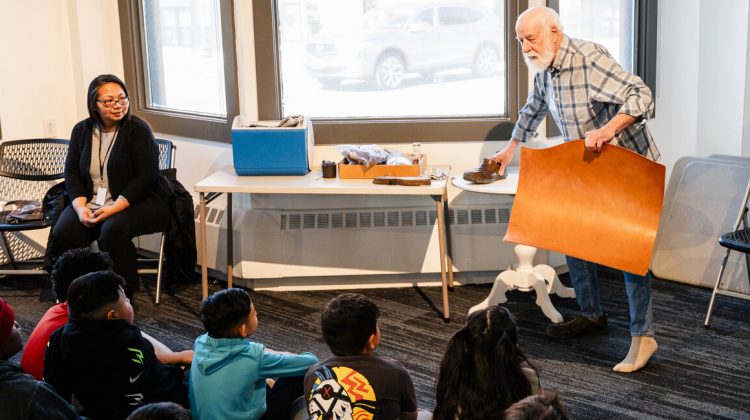LYNN — At the Lynn Museum, for the first time, the History Detectives program served all of the third graders in the city’s public schools.
The program, which is connected to the state’s history curriculum, helped teach the students all about the history of the city.
Lynn Public Schools Assistant Director of Curriculum Kristen Tabacco said that previously, the museum had only done this program with a couple of the schools in the city. She decided to change that when she became the assistant director.
“All third graders deserve this experience… to learn what it’s like at the museum, the history of Lynn, the city they live in, and that’s what kind of drove me to pursue this as a larger program,” Tabacco said.
Tabacco hoped that the program would help teach students about the diversity of the city and “people of color that made huge contributions to, not only to Lynn, but to the world.”
She also wanted students to learn about the importance of primary sources.
“Some of the machines, like the shoe-lasting machine, the jet engines from GE, I want them to see those in real life, because a lot of the kids have not been to any museums at this age,” Tabacco said.
Tabacco’s favorite piece in the museum is Ellie the Elephant, a homemade stuffed animal from the late 19th century, which is reserved just for visiting third graders.
She said that it is a great representation of the craftsmanship of women who were manufacturing these items at home in a type of “cottage industry” before larger factories began to produce them.
“It’s a really engaging piece for the kids, and they just light up when they see it,” she said.
JROTC members from Lynn Classical High School, through the assistance of Master Sgt. Jose Beato, were also in attendance at the program to provide help to the docents working with the children.
“This is an important part of their education, and an important part of their lives as people who live in Lynn,” JROTC member Cole DeStefano said. “I don’t feel like the history of Lynn is shared a lot, so I think it’s important that us, the JROTC program, can help show these kids and be a part of these kids learning experience.”
Lynn Museum Executive Director Doneeca Thurston-Chavez said that the program is so special because it is just for third graders.
“I remember being a third grader in Lynn Public Schools and coming to this building when it was a visitors center for Lynn Heritage State Park, and it left an impression on me to learn how diverse and varied our history is,” Thurston-Chavez said. “So, it’s really special to be able to continue that tradition with our History Detectives program.”
Thurston-Chavez said that she hopes the museum can teach students about the connection between what they learn about in history class and the city.
“Those same things, those movements, those moments have happened here in Lynn,” she said.
Thurston-Chavez said that students are “absolutely” receptive to the material at the museum. When students complete the History Detectives program, she said they are given family membership passes for the following year.
Teacher Lauren Leroux said that students have been extremely excited about the program, and that their jaws dropped in awe when they saw the objects in the museum.
One student, Aashanti, said that her favorite part of the museum was the shoe-medallion painting, which was presented at the Chicago World’s Fair, with shoe soles in the medallion representing each of Lynn’s shoe factories. She said it was her first time at the museum, and when she was asked if she would be returning, she nodded with excitement.
Gayle Richardson, a docent at the museum, said that it is reassuring to see the students interested in history.
“They ask questions, they listen, they respond, they’re polite, it restores my faith in the next generation,” she said.
A lesson that Richardson wants students to get out of the museum is that history isn’t restricted to things in the past.
“History is what you’re doing today. It’s the stories of people, and people who speak different languages, who have different skills… giving students an appreciation of why they are where they are… helping kids understand that they live the life they live because someone had an invention, or did something to make the world better, and you can, too,” Richardson said.

